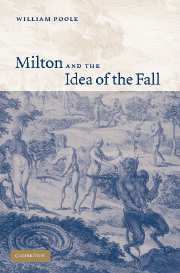Conclusion
Published online by Cambridge University Press: 10 December 2009
Summary
John Rumrich, discussing Stanley Fish's influential Surprised by Sin, observed that Fish's Milton, who ensnares the reader only to correct, was safe old Milton-the-Christian-Bard decanted into the new bottles provided by reader response theory. What had looked like Milton being dangerous was merely Milton manipulating the reader. Rumrich considered this a bit of a cheat, and rightly so. This book has attempted to do the opposite. The Milton presented here is again the dynamic, potentially dangerous Milton, but located against a contemporary background of countless other dynamic, potentially dangerous projects. In other words, Fish, although apparently relying on contemporary readers of Genesis, produced few contemporary readings of Genesis, and this seriously compromised his book.
I do hope that my contemporary readings provide at least drinkable plonk. This book has stressed the structural, inherited problems Milton faced, and this frees us from the limitations of reader response, which in Fish's case was the construction of a robotically boring reader – one, in fact, who would probably not have bothered to read Paradise Lost at all. Further, Milton and his ideas on the Fall are treated as yet another set of reactions or tendencies, to be located in a larger network of philosophical, theological and social possibilities. This is ‘The Christian Tradition’, though absolutely not in the guise in which C. A. Patrides dressed it: as a dull set of immobile dogmas, recognised by all, interesting to none.
- Type
- Chapter
- Information
- Milton and the Idea of the Fall , pp. 195 - 199Publisher: Cambridge University PressPrint publication year: 2005

